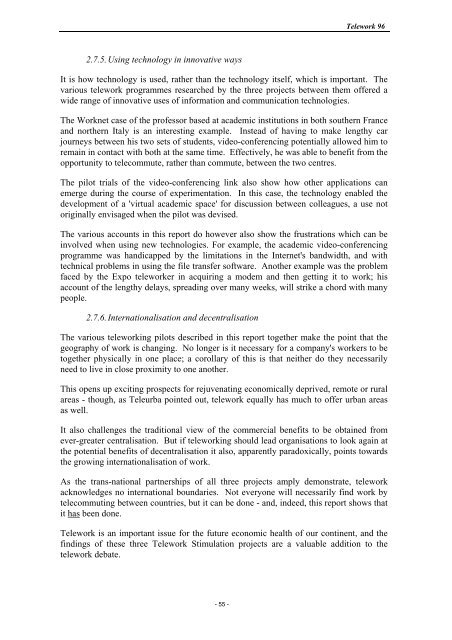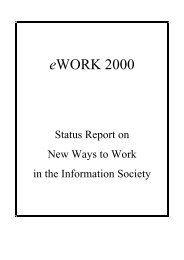1996 - European Telework Week
1996 - European Telework Week
1996 - European Telework Week
- No tags were found...
You also want an ePaper? Increase the reach of your titles
YUMPU automatically turns print PDFs into web optimized ePapers that Google loves.
<strong>Telework</strong> 96<br />
2.7.5. Using technology in innovative ways<br />
It is how technology is used, rather than the technology itself, which is important. The<br />
various telework programmes researched by the three projects between them offered a<br />
wide range of innovative uses of information and communication technologies.<br />
The Worknet case of the professor based at academic institutions in both southern France<br />
and northern Italy is an interesting example. Instead of having to make lengthy car<br />
journeys between his two sets of students, video-conferencing potentially allowed him to<br />
remain in contact with both at the same time. Effectively, he was able to benefit from the<br />
opportunity to telecommute, rather than commute, between the two centres.<br />
The pilot trials of the video-conferencing link also show how other applications can<br />
emerge during the course of experimentation. In this case, the technology enabled the<br />
development of a 'virtual academic space' for discussion between colleagues, a use not<br />
originally envisaged when the pilot was devised.<br />
The various accounts in this report do however also show the frustrations which can be<br />
involved when using new technologies. For example, the academic video-conferencing<br />
programme was handicapped by the limitations in the Internet's bandwidth, and with<br />
technical problems in using the file transfer software. Another example was the problem<br />
faced by the Expo teleworker in acquiring a modem and then getting it to work; his<br />
account of the lengthy delays, spreading over many weeks, will strike a chord with many<br />
people.<br />
2.7.6. Internationalisation and decentralisation<br />
The various teleworking pilots described in this report together make the point that the<br />
geography of work is changing. No longer is it necessary for a company's workers to be<br />
together physically in one place; a corollary of this is that neither do they necessarily<br />
need to live in close proximity to one another.<br />
This opens up exciting prospects for rejuvenating economically deprived, remote or rural<br />
areas - though, as Teleurba pointed out, telework equally has much to offer urban areas<br />
as well.<br />
It also challenges the traditional view of the commercial benefits to be obtained from<br />
ever-greater centralisation. But if teleworking should lead organisations to look again at<br />
the potential benefits of decentralisation it also, apparently paradoxically, points towards<br />
the growing internationalisation of work.<br />
As the trans-national partnerships of all three projects amply demonstrate, telework<br />
acknowledges no international boundaries. Not everyone will necessarily find work by<br />
telecommuting between countries, but it can be done - and, indeed, this report shows that<br />
it has been done.<br />
<strong>Telework</strong> is an important issue for the future economic health of our continent, and the<br />
findings of these three <strong>Telework</strong> Stimulation projects are a valuable addition to the<br />
telework debate.<br />
- 55 -








